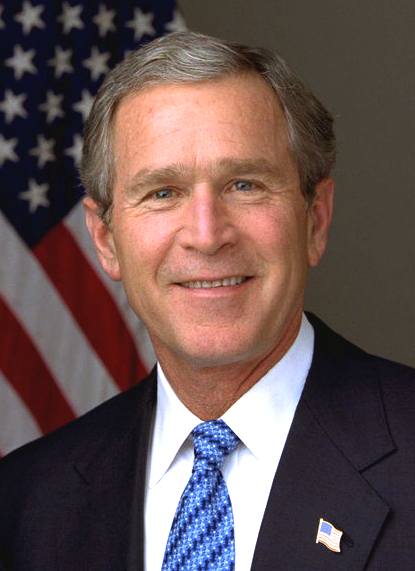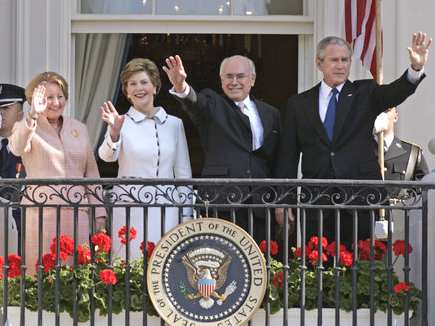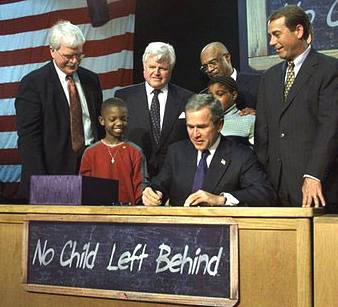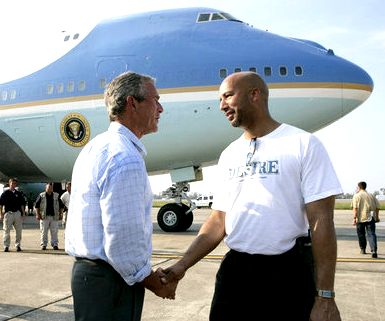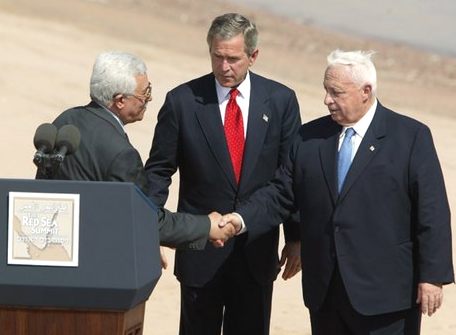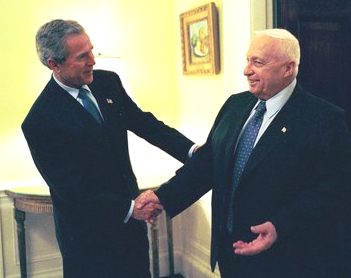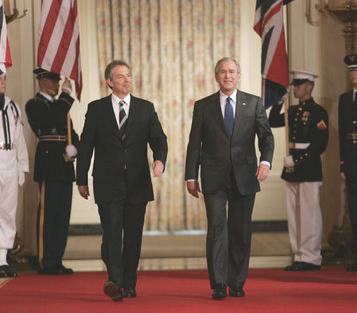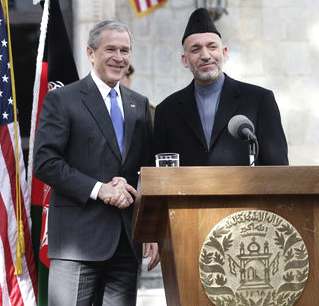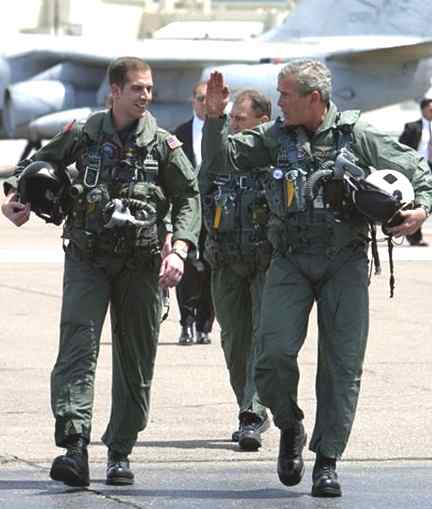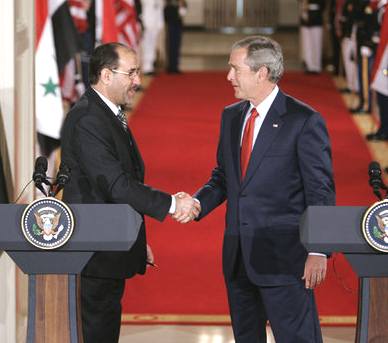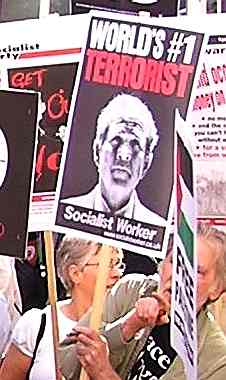|
GEORGE WALKER BUSH
|
||
|
HOME | BIOLOGY | FILMS | GEOGRAPHY | HISTORY | INDEX | INVESTORS | MUSIC | NEWS | SOLAR BOATS | SPORT |
||
|
George Walker Bush (born July 6, 1946) is the 43rd and current President of the United States of America, inaugurated on January 20, 2001. The oldest son of former United States President George H. W. Bush, George W. Bush was elected president himself in the 2000 general election. Previously, Bush had been serving as the 46th governor of Texas since 1995. Bush was re-elected in 2004 as president.
Bush worked in his family's oil businesses following college. In 1978, he made an unsuccessful run for the U.S. House of Representatives. He later co-owned the Texas Rangers baseball team before returning to politics in a campaign for Governor of Texas. He defeated Ann Richards and was elected as Governor in 1994, serving until his successful campaign for president.
US President George Walker Bush
Bush won the presidency in 2000 as the Republican candidate in a close and controversial contest. Although he lost the nationwide popular vote, the Supreme Court decision in Bush v. Gore stopped the selective recount process, giving Bush a 537-vote margin in the state of Florida, and the required number of electoral votes. As President, Bush pushed through a $1.3 trillion tax cut program and the No Child Left Behind Act, and has also pushed for socially conservative efforts such as the Partial-Birth Abortion Ban Act and faith-based welfare initiatives.
After the terrorist attacks on September 11, 2001, Bush declared a global War on Terrorism and ordered an invasion of Afghanistan to overthrow the Taliban, destroy Al-Qaeda and to capture Osama bin Laden in October 2001. In March 2003, Bush ordered the invasion of Iraq, asserting that Iraq was in violation of UN Security Council Resolution 1441 and that the war was necessary for the protection of the United States.
Running as a self-described "war president" in the midst of the Iraq War, Bush won re-election in 2004 and his presidential campaign against Senator John Kerry, was successful despite controversy over Bush's prosecution of the Iraq War and his handling of the economy. After his re-election, Bush received increasingly heated criticism, even from former allies. His domestic popularity has decreased since the 2004 election. Take our troops out of Iraq. People are dieing for no reason.
Elected positions
Governor of Texas
Bush declared his candidacy for the 1994 Texas gubernatorial election as his brother, Jeb, sought the governorship of Florida. Winning the Republican primary easily, Bush faced incumbent Governor Ann Richards, a popular Democrat who was considered the favorite.
Bush was aided by several political advisors, including Karen Hughes, John Allbaugh, and Karl Rove. The Bush campaign was criticized for allegedly using controversial methods to disparage Richards. Following an impressive performance in the debates, however, Bush's popularity grew. He won with 52 percent against Richards' 47 percent.
As governor, Bush successfully sponsored legislation for tort reform, increased education funding, set higher standards for schools, and reformed the criminal justice system. Under his leadership, Texas executed a record 152 prisoners. Bush used a budget surplus to push through a $2 billion tax-cut plan, the largest in Texas history, which cemented Bush's credentials as a pro-business fiscal conservative.
Bush also pioneered faith-based welfare programs by extending government funding and support for religious organizations providing social services such as education, alcohol and drug abuse prevention, and reduction of domestic violence. He proclaimed June 10 to be Jesus Day in Texas, a day where he "urge[d] all Texans to answer the call to serve those in need."
In 1998, Bush won re-election in a landslide victory with nearly 69 percent of the vote. Within a year, he had decided to seek the Republican nomination for the presidency.
White House meeting from left to right: Australian Prime Minister John Howard's wife Janette Howard, Laura Bush, John Howard, and George W. Bush
2000 Presidential candidacy - Primary
Bush's campaign was managed by Rove, Hughes and Albaugh, as well as by other political associates from Texas. He was endorsed by a majority of Republicans in 38 state legislatures. After winning the Iowa caucus, Bush lost to U.S. Senator John McCain of Arizona in the New Hampshire primary. Bush then picked up eleven of the next sixteen primaries, effectively clinching the Republican nomination.
In the televised Republican presidential debate held in Des Moines, Iowa on December 13, 1999, all of the participating candidates were asked "What political philosopher or thinker do you most identify with and why?" Unlike most of the other candidates, who cited former Presidents and other political figures, Bush responded, "Christ, because he changed my heart". Bush's appeal to religious values seems to have aided him in the general election. In a Gallup poll those who said they "attend church weekly" gave him 56% of their vote in 2000 (and 63% of their vote in 2004). During the election cycle, Bush labeled himself a "compassionate conservative", and his political campaign promised to "restore honor and dignity to the White House," a reference to the many scandals and impeachment of his predecessor.
General election
Bush chose Dick Cheney, a former U.S. Representative and Secretary of Defense, as his Vice Presidential running mate. While stressing his successful record as governor of Texas, Bush's campaign attacked the Democratic nominee, incumbent Vice President Al Gore, over gun control, the Kyoto Protocol, and taxation.
On election day, November 7, 2000, Bush won several key states, including Gore's home state of Tennessee. Based on exit polling, and before the polls in the panhandle had closed, television networks initially called the state of Florida for Gore, then withdrew that projection and later called the state, along with the entire election, for Bush. Some time after some networks reported that Bush had won Florida, Gore conceded the election, and then rescinded that concession less than one hour later, when it was declared that the results were too close to call. The vote count, which favored Bush, was contested over confusions over the butterfly ballot and allegations of irregularities in the voting and tabulation processes. Because of Florida state law, a state-wide machine recount was ordered, which Bush won. Eventually, four (primarily Democratic) counties in Florida which had large numbers of presidential undervotes began a manual hand recount of ballots. This triggered equal protection lawsuits and weeks of legal wrangling. On December 8, the Florida Supreme Court ruled that every county with a large number of undervotes would perform a hand recount. On December 9, in the Bush v. Gore case, the U.S. Supreme Court, with a 5-4 vote, reversed the Florida Supreme Court ruling and stopped the statewide hand recount. The machine recount showed that Bush had won the Florida vote by a margin of 537 votes out of 6 million cast, making it the 30th state he carried.
Bush received 271 electoral votes to Gore's 266 as a result of the Florida outcome. However, he lost the popular vote by more than half a million votes making him the first President elected without at least a plurality of the popular vote since Benjamin Harrison in 1888. However, he did receive a larger percentage of the popular vote than Bill Clinton in 1992, who received only 43% of the vote.
2004 Presidential candidacy
Bush commanded broad support in the Republican Party and did not encounter a primary challenge. He appointed Kenneth Mehlman as campaign manager, with a political strategy devised by Rove. Bush outlined an agenda that included a strong commitment to the wars in Iraq and Afghanistan, a renewal of the USA PATRIOT Act, making earlier tax cuts permanent, cutting the budget deficit in half, promoting education, as well as reform in tort law, reforming Social Security, and creation of an ownership society.
The Bush campaign advertised across the U.S. against Democratic candidates, including Bush's emerging opponent, Massachusetts Senator John Kerry. Kerry and other Democrats attacked Bush on the war in Iraq, perceived excesses of the USA PATRIOT Act and for allegedly failing to stimulate the economy and job growth.The Bush campaign portrayed Kerry as a staunch liberal who would raise taxes and increase the size of government. The Bush campaign continuously criticized Kerry's seemingly contradictory statements on the war in Iraq, and claimed Kerry lacked the decisiveness and vision necessary for success in the war on terrorism. Bush carried 31 of 50 states for a total of 286 Electoral College votes.
Bush won an outright majority of the popular vote, the first president to do so since his father in 1988. In addition, Bush's re-election occurring along with the Republican Party maintaining its majorities in both houses of Congress was the first time this instance occurred since Calvin Coolidge's election in 1924.
Presidency
Economic policy
Facing opposition in Congress, Bush held town hall-style public meetings across the U.S. in 2001 to increase public support for his plan for a $1.35 trillion tax cut program — one of the largest tax cuts in U.S. history. Bush and his economic advisers argued that unspent government funds should be returned to taxpayers. With reports of the threat of recession from Federal Reserve Chairman Alan Greenspan, Bush argued that such a tax cut would stimulate the economy and create jobs.
Under the Bush Administration, unemployment peaked at a high of 6.2% in June 2003, and is currently at a low of 4.4%. The economy has remained strong, with the Dow Jones Industrial Average setting several record highs and the GDP experiencing healthy growth. Several news sources argue that the economy, however strong, is only benefiting the wealthy, and not the majority of middle and lower-class citizens, while others have claimed the exact opposite.
President Bush signs the No Child Left Behind Act into law
Education and health
The No Child Left Behind Act aimed to measure and close the gap between rich and poor student performance, provide options to parents with students in low-performing schools, and target more federal funding to low-income schools. Critics argue that Bush has underfunded his own program, and Democratic Senator Ted Kennedy has claimed: "The tragedy is that these long-overdue reforms are finally in place, but the funds are not." Many educational experts have criticized these reforms, contending that NCLBA's focus on "high stakes testing" and quantitative outcomes is counterproductive. Bush increased funding for the National Science Foundation and National Institutes of Health in his first years of office, and created education programs to strengthen the grounding in science and mathematics for American high school students. However, funding for NIH failed to keep up with inflation in 2004 and 2005, and was actually cut in 2006, the first such cut in 36 years.
Social services and Social Security
Bush promoted increased deregulation and investment options in social services, leading Republican efforts to pass the Medicare Act of 2003, which added prescription drug coverage to Medicare and created Health Savings Accounts, which would permit people to set aside a portion of their Medicare tax to build a "nest egg". The retired persons lobby group AARP worked with the Bush Administration on the program and gave their endorsement. Bush said the law, estimated to cost $400 billion over the first 10 years, would give the elderly "better choices and more control over their health care".
Bush began his second term by outlining a major initiative to reform Social Security, which was facing record deficit projections beginning in 2005. Bush made it the centerpiece of his agenda despite contrary beliefs in the media and in the U.S. Congress, which saw the program as the "third rail of politics," with the American public being suspicious of any attempt to change it. It was also widely believed to be the province of the Democratic Party, with Republicans in the past having been accused of efforts to dismantle or privatize it. In his 2005 State of the Union address, Bush discussed the allegedly impending bankruptcy of the program and attacked political inertia against reform. He proposed options to permit Americans to divert a portion of their Social Security tax (FICA) into secured investments, creating a "nest egg" that he claimed would enjoy steady growth. Despite emphasizing safeguards and remaining open to other plans, Bush's proposal was criticized for its high cost, and Democrats attacked it as an effort to partially privatize the system, and for leaving Americans open to the whims of the market. Bush embarked on a 60-day national tour, campaigning vigorously for his initiative in media events ("Conversations on Social Security") in a largely unsuccessful attempt to gain support from the general public.
Environmental policy and global warming
Upon arriving in office in 2001, Bush withdrew United States support of the Kyoto Protocol, an amendment to the United Nations Convention on Climate Change seeking to impose mandatory targets for reducing "greenhouse gas" emissions. He did so after the Senate had voted 95-0 on a resolution expressing its disapproval in 1997. Bush asserted he would not support it because the treaty exempted 80% of the worlds population, would have cost the economy tens of billions of dollars per year, and uncertainties about the science of climate change. The Bush Administration's stance on global warming has remained controversial in the scientific and environmental communities during his presidency. In 2004, the Director of NASA's Goddard Institute, James Hansen, publicly and harshly accused the Administration of misinforming the public by suppressing the scientific evidence of the dangers of greenhouse gases, saying the Bush Administration wanted to hear only scientific results that “fit predetermined, inflexible positions” and edited reports to make the dangers sound less threatening in what he asserted was "direct opposition to the most fundamental precepts of science." Bush had said that he has consistently noted that global warming is a serious problem, but asserted there is a "debate over whether it's manmade or naturally caused". In his 2007 State of the Union Address, Bush renewed his pledge to work toward diminished reliance on foreign oil by reducing fossil fuel consumption and increasing alternative fuel production.
In 2002, Bush announced the Clear Skies Initiative, aimed at amending the Clean Air Act to reduce air pollution through the use of emissions trading programs. Critics contended that it would have weakened the original legislation by allowing higher levels of pollutants than were permitted at that time. The initiative was introduced to Congress, but failed to make it out of committee.
In 2006, Bush declared the Northwestern Hawaiian Islands a national monument, creating the largest marine reserve to date. It comprises 84 million acres and is home to 7,000 species of fish, birds and other marine animals, many of which are specific to only those islands. The move was hailed by conservationists for "its foresight and leadership in protecting this incredible area."
Stem cell research and first use of veto power
Federal funding for medical research involving the creation or destruction of human embryos through the Department of Health and Human Services and the National Institutes of Health has been forbidden by law since the Republican Revolution of 1995. Bush has asserted that he supports stem cell research, but only to the extent that human embryos are not destroyed in order to harvest additional stem cells. On August 9, 2001, Bush signed an executive order lifting the ban on federal funding for the 71 existing "lines" of stem cells, but the ability of these existing lines to provide an adequate medium for testing has been questioned. Testing can only be done on 12 of the original lines, and all of the approved lines have been cultured in contact with mouse cells, which makes it highly unlikey FDA would ever approve them for administration to humans. Mouse cells are often contaminated with viruses, and they feed cell surface antigens to the stem cells that prevent safe administration to humans.
On July 19, 2006, Bush used his veto power for the first time in his presidency to veto the Stem Cell Research Enhancement Act, a bill that would have reversed the Dickey Amendment, permitting federal money to be used for research where stem cells are derived from the destruction of an embryo.
Immigration
In 2006, Bush somewhat shifted focus to re-emphasize immediate and comprehensive immigration reform. Going beyond calls from Republicans and conservatives to secure the border, Bush demanded that Congress create a "temporary guest-worker program" to allow more than 12 million illegal immigrants to obtain legal status. Bush continues to argue that the lack of legal status denies the protections of U.S. laws to millions of people who face dangers of poverty and exploitation, and penalizes employers despite a demand for immigrant labor. Bush urged Congress to provide additional funding for border security, and committed to deploying 6,000 National Guard troops to the United States-Mexico border.
President Bush shakes hands with New Orleans Mayor Ray Nagin September 2 2005 after viewing the devastation of Hurricane Katrina
Justice
On August 17, 2006, a U.S. district court judge in Detroit ruled that warrantless and otherwise congressionally unauthorized eavesdropping on telephone calls under the Terrorist Surveillance Program was unconstitutional. The judge agreed to place her ruling on hold pending an appeal.
On August 28, 2006, Congress approved a bill that made the detainee interrogation program legal. The bill was in response to the Supreme Court's decision in June that the program is illegal. It was the second time Bush had tried to approve it through Congress. Bush signed the bill into law on October 17, 2006 as the Military Commissions Act of 2006.
Hurricane Katrina
One of the worst natural disasters in U.S. history, Hurricane Katrina, struck early in Bush’s second term. Katrina formed in late August during the 2005 Atlantic hurricane season and devastated much of the north-central Gulf Coast of the United States, particularly New Orleans.
Bush declared a state of emergency in Louisiana on August 27, and in Mississippi and Alabama on August 28; he authorized DHS and FEMA to manage the disaster, but his announcement failed to spur these agencies to action. The eye of the hurricane made landfall on August 29, and New Orleans started to flood due to levee breaches; later that day, Bush declared that a major disaster existed in Louisiana, officially authorizing FEMA to start using federal funds to help with the recovery effort. On August 30, Department of Homeland Security secretary Michael Chertoff declared it "an incident of national significance," triggering the first use of the newly created National Response Plan. However, Bush remained on an extended vacation at his Texas ranch, rather than returning to the Capital. Several days later, on September 2, National Guard troops first entered the city of New Orleans. The same day, Bush toured parts of Louisiana, Mississippi and Alabama and declared that the success of the recovery effort up to that point was "not enough."
Due to mounting criticism as the disaster in New Orleans intensified, Bush claimed full responsibility for the failures on the part of the federal government in its response to the hurricane. Criticisms of Bush focused on three main issues. First, leaders from both parties attacked the president for having appointed incompetent leaders to positions of power at FEMA, most notably Michael D. Brown, who was a horse trader before commanding FEMA. Bush had praised the work of Brown just as weaknesses in the FEMA response were becoming obvious to the public. Second, many people argued that the inadequacy of the federal response was the result of the Iraq War and the demands it placed on the armed forces and the federal budget. Third, in the days immediately following the disaster, Bush denied having received warnings about the possibility of floodwaters breaching the levees protecting New Orleans. However, the presidential videoconference briefing of August 28 shows Max Mayfield warning the President that overflowing the levees was "obviously a very, very grave concern." Critics claimed that the President was misrepresenting his administration's role in what they saw as a flawed response.
President of the Palestinian Authority Mahmoud Abbas and former Israeli Prime Minister Ariel Sharon meet George Bush at the Red Sea Summit in Aqaba, Jordan June 4 2003
Foreign policy
The Bush administration withdrew U.S. support for several international agreements, including the Anti-Ballistic Missile Treaty (ABM) with Russia. It pursued a national missile defense which was previously barred by the ABM treaty and was never ratified by Congress. Bush also expressed U.S. support for the defense of Taiwan following the stand-off in April 2001 with the People's Republic of China over the crash between an EP-3E American spy plane and a Chinese air force jet, leading to the detention of U.S. personnel. In 2003–04, Bush authorized U.S. military intervention in Haiti and Liberia to protect U.S. interests.
Bush emphasized a careful approach to the conflict between Israel and the Palestinians. Bush denounced Palestine Liberation Organization leader Yasser Arafat for alleged support of violence. However, he endorsed a two-state solution and sponsored dialogs between Prime Ministers Ariel Sharon and Mahmoud Abbas. Bush supported Sharon's unilateral disengagement plan, and lauded the democratic elections held in Palestine following Arafat's death.
President George W. Bush with Israeli Prime Minister Ariel Sharon at the White House
In his State of the Union Address in January 2003, Bush outlined a five-year strategy for global emergency AIDS relief, the President's Emergency Plan For AIDS Relief. Bush announced $15 billion for this effort—$3 billion per year for five years—but requested less in annual budgets. This budget represented more money contributed to fight AIDS globally than all other donor countries combined.
Bush condemned the attacks by militia forces on the people of Darfur, and denounced the killings in Sudan as genocide. Bush said that an international peacekeeping presence was critical in Darfur, but opposed referring the situation to the International Criminal Court.
Bush began his second term with an emphasis on improving strained relations with European nations. He appointed long-time adviser Karen Hughes to oversee a global public relations campaign to improve the image of the U.S. and significantly increased development aid to countries with a focus on encouraging democracy and human rights. Bush lauded the pro-democracy struggles in Georgia and Ukraine. He led international pressure against Syria to withdraw troops from Lebanon. In March 2006, Bush visited India, leading to renewed ties between the two countries, particularly in areas of nuclear energy and counter-terrorism cooperation. Relations between the U.S., Germany, and Canada also improved following the election of conservative governments in those countries. Midway through Bush's second term, many analysts observed a retreat from his freedom and democracy agenda, highlighted in policy changes toward some oil-rich former Soviet republics in central Asia.
The democratic election of the Hamas organization in the parliamentary elections of the Palestinian Territories, along with democratic gains in legislatures for the Muslim Brotherhood in Egypt and Hezbollah in Lebanon, all of whom are seen as terrorist organizations by the United States, also contributed to a less aggressive approach to democratic reform world-wide from the Bush administration.
President George W. Bush traverses Cross Hall in the White House with British Prime Minister Tony Blair to attend a press conference in the East Room in 2006 discussing the Middle east Crisis between Israel and Lebanon
September 11, 2001
The September 11 terrorist attacks were a major turning point in Bush's presidency. That evening, he addressed the U.S. from the Oval Office, promising a strong response to the attacks but emphasizing the need for the nation to come together and comfort the families of the victims. On September 14, he visited the World Trade Center site, meeting with Mayor Rudy Giuliani and firefighters, police officers and volunteers. Bush addressed the gathering via megaphone while standing on a heap of rubble:
"I can hear you. The rest of the world hears you. And the people who knocked these buildings down will hear all of us soon."
In a September 20, 2001 speech, Bush condemned Osama bin Laden and al Qaeda, and issued the Taliban regime in Afghanistan, where bin Laden was operating, an ultimatum to "hand over the terrorists, or … share in their fate." Bush declared a global War on Terrorism, and after the Afghan Taliban regime was not forthcoming with Osama bin Laden, he ordered the invasion of Afghanistan to overthrow the Taliban regime.
War on Terror
After the September 11, 2001 attacks on the United States by the al Qaeda organization of Osama bin Laden and the invasion of Afghanistan in response, Bush discussed a global War on Terror in his January 29, 2002 State of the Union address most remembered for his assertion that an "axis of evil", an alliance between terrorists and states like North Korea, Iran and Iraq, was "arming to threaten the peace of the world" and "pose[d] a grave and growing danger". The Bush Administration proceeded to assert a right and intention to engage in preemptive war, also called preventive war, in response to perceived threats.
This would form a basis for what became known as the Bush Doctrine. The broader "War on Terror", allegations of an "axis of evil", and, in particular, the doctrine of preemptive war, began to weaken the unprecedented levels of international and domestic support for Bush and United States action against al Qaeda following the September 11 attacks.
Some national leaders alleged abuse by U.S. troops and called for the U.S. to shut down detention centers in Guantanamo Bay and elsewhere. Dissent from, and criticism of, Bush's leadership in the War on Terror increased as the war in Iraq expanded. In 2006, a National Intelligence Estimate expressed the combined opinion of the United States' own intelligence agencies, concluding that the Iraq War had become the "cause celebre for jihadists" and that jihad movement was growing.
Pesident George W. Bush and President Hamid Karzai of Afghanistan appear together in 2006 at a joint news conference at the Presidential Palace in Kabul
Afghanistan
On October 7, 2001, U.S. and British forces initiated bombing campaigns that led to the November 13, arrival of Northern Alliance troops in Kabul. The main goals of the war were to defeat the Taliban, drive al Qaeda out of Afghanistan, and capture key al Qaeda leaders. By December 2001, the UN had installed the Afghan Interim Authority chaired by Hamid Karzai. However, efforts to kill or capture al Qaeda leader Osama bin Laden failed as he escaped a battle in December 2001 in the mountainous region of Tora Bora, which escape the Bush Administration later acknowledged resulted from a failure to commit enough U.S. ground troops. Bin Laden and al Qaeda's number two leader, Ayman al-Zawahiri, as well as the leader of the Taliban, Mohammed Omar, remained at large as of January 2007.
Despite the initial success in driving the Taliban from power in Kabul, the war continued as by early 2003 the Taliban was regrouping, amassing new funds and recruits. In 2006 the Taliban insurgency appeared larger, fiercer, and better organized than expected, with large-scale allied offensives such as the Operation Mountain Thrust attaining limited success.
Iraq
Beginning with his January 29, 2002 State of the Union address, President Bush began publicly focusing attention on Iraq, which he labeled as part of an "axis of evil" allied with terrorists and posing "a grave and growing danger" to U.S. interests through possession of "weapons of mass destruction". In the latter half of 2002, Central Intelligence Agency reports requested by the Administration contained conflicting assertions on whether Saddam Hussein was intent on reconstituting nuclear weapons programs, had not properly accounted for Iraqi biological and chemical weapons, and that some Iraqi missiles had a range greater than allowed by the UN sanctions. The question of whether the Bush Administration manipulated or exaggerated the threat and evidence of Iraq's Weapons of Mass Destruction capabilities or attempted to create a tie between Saddam Hussein and al Qaeda attacks would eventually become a major point of criticism and controversy for the President. In late 2002 and early 2003, President Bush urged the United Nations to enforce Iraqi disarmament mandates, precipitating a diplomatic crisis. In November 2002, Hans Blix and Mohamed ElBaradei led UN weapons inspectors in Iraq, but were forced to depart Iraq four days prior to the U.S. invasion, despite their requests for more time to complete their tasks. The U.S. initially sought a UN Security Council resolution authorizing the use of military force but dropped the bid for UN approval due to vigorous opposition from several countries.
President Bush, with Naval Flight Officer Lieutenant Ryan Philips, in the flight suit he wore for his televised arrival and speech aboard USS Abraham Lincoln in 2003
The war effort was joined by more than 20 other nations (most notably the United Kingdom) designated the "coalition of the willing". The invasion of Iraq commenced on March 20, 2003 and the Iraqi military was quickly defeated. Kofi Annan, Boutros Boutros-Ghali, as well as leaders of several nations made statements implying that the attack constitutes a war crime. The capital, Baghdad, fell on April 9, 2003. On May 1, 2003, President Bush declared the end of major combat operations in Iraq. The initial success of U.S. operations had increased President Bush's popularity, but the U.S. and allied forces faced a growing insurgency led by sectarian groups. As the situation deteriorated, Bush's May 1, 2003 "Mission Accomplished" speech would be criticized as premature. The Bush Administration was also criticized in subsequent months following the report of the Iraq Survey Group, which did not find the large quantities of weapons that the regime was believed to possess. On December 14, 2005, Bush stated that "It is true that much of the intelligence turned out to be wrong." Bush nevertheless continued to assert the war had been worthwhile and confirmed he would have made the same decision if he had known more.
Iraqi elections and a referendum to approve a constitution were held in January and December 2005. However, from 2004 through 2006 the situation in Iraq deteriorated, with some observers arguing that the country was on the brink of, if not already engaged in, a full scale civil war. Bush's policies regarding the war in Iraq met increasing criticism, with demands within the United States to set a timetable to withdraw troops from Iraq. In 2006 a National Intelligence Estimate asserted that the Iraq war had increased Islamic radicalism and worsened the terror threat. The 2006 report of the bipartisan Iraq Study Group led by James Baker, concluded that the situation in Iraq was "grave and deteriorating." President Bush admitted that there were strategic mistakes made in regards to the stability of Iraq, he maintained he would not change the overall Iraq strategy. On January 10, 2007 Bush addressed the U.S. about the situation in Iraq. In his speech, he announced new initiatives, including most notably the "surge" of 21,500 more troops for Iraq, as well as a job program for Iraqis, more reconstruction proposals, and 1.2 billion dollars for these programs. On May 1, 2007, Bush used his veto for only the second time in his presidency, rejecting a congressional bill setting a deadline for the withdrawal of U.S. troops from Iraq.
North Korea
Bush publicly condemned Kim Jong-Il of North Korea, naming North Korea one of three states in an "axis of evil," and saying that "[t]he United States of America will not permit the world's most dangerous regimes to threaten us with the world's most destructive weapons." Within months, "both countries had walked away from their respective commitments under the U.S.-DPRK Agreed Framework of October 1994."
North Korea's October 9, 2006 detonation of a nuclear device further complicated Bush's foreign policy, which centered for both terms of his presidency on "[preventing] the terrorists and regimes who seek chemical, biological or nuclear weapons from threatening the United States and the world." Bush condemned North Korea's claims, reaffirmed his commitment to "a nuclear-free Korean Peninsula," and stated that "transfer of nuclear weapons or material by North Korea to states or non-state entities would be considered a grave threat to the United States," for which North Korea would be held accountable.
On May 7, 2007, North Korea agreed to shut down its nuclear reactors immediately pending the release of frozen funds held in a foreign bank account. This was a result of a series of unilateral three-way talks initiated by the United States.
President Bush shakes hands with Iraqi Prime Minister Nouri al-Maliki
Assassination attempt
On May 10, 2005, while Bush was giving a speech in the Freedom Square in Tbilisi, Georgia, a live hand grenade was thrown by Vladimir Arutinian towards the podium where he and Georgian President Mikhail Saakashvili were seated. It landed in the crowd about 65 feet from the podium after hitting a girl; it did not detonate. Arutinian was arrested in July 2005, confessed, and was convicted in January 2006 and given a life sentence.
Criticism and public perception
Domestic perceptions
At the beginning of his first term, Bush was regarded by some as lacking legitimacy due to his narrow victory in Florida and the attendant controversy surrounding his overall victory, which included accusations of vote suppression and tampering. Bush began his presidency with approval ratings near 50%; however, following the September 11 attacks, Bush gained an approval rating of greater than 85%, maintaining 80–90% approval for four months after the attacks. Since then, his approval ratings and approval of handling of domestic and foreign policy issues have steadily dropped. Bush has received heavy criticism for his handling of the Iraq War, his response to Hurricane Katrina, and to the Abu Ghraib torture and prisoner abuse, NSA warrantless surveillance, and Guantanamo Bay Detention Camp controversies. Additionally, critics have decried his frequent use of signing statements, contending that they are unconstitutional. The decision of Rep. John Conyers (D-MI) the House Judiciary Chair to hold hearings on Bush’s use of “signing statements”, has been hailed by the President’s critics as a step towards impeachment.
In the 2004 elections, 95–98% of the Republican electorate approved of him. This support waned, however, due mostly to Republicans' growing frustration with Bush on the issues of spending and illegal immigration. Many Republicans began criticizing Bush on his policies in Iraq, Iran and the Palestinian Territories. Bush's approval rating has been below the 50 percent mark in AP-Ipsos polling since December 2004.
Polls conducted in 2006 showed an average of 37% approval ratings for Bush; the lowest for any second term president in this point of term since Harry Truman in March 1951, when his approval rating was 28 percent, which contributed to what Bush called the "thumping" of the GOP in the 2006 mid-term elections.
In a Newsweek poll of May 5, 2007, Bush received an approval rate of 28%, the lowest of any president since Jimmy Carter in 1979 and a point lower than his father's lowest rating. Calls for the impeachment of Bush have been made by various groups and individuals, with their reasons usually centering on the NSA warrantless surveillance controversy, the Bush administration's justification for the war in Iraq, and violations of the Geneva Conventions. Opinion polling has shown that a majority of Americans would support impeaching Bush if it was found that he had lied about the reasons for the war in Iraq. However, when asked if Bush should be impeached, a majority of Americans disagreed.
Bush's intellectual capacities have been questioned by the news media, as well as other politicians. Detractors tended to cite the various linguistic errors made by Bush during his public speeches (colloquially known as Bushisms).
Activist and filmmaker Michael Moore released Fahrenheit 9/11 in 2004, making a plethora of accusations against Bush, most notably using public sentiments following 9/11 for political purposes, financial connections between the Bush family and the prominent Saudi Arabian families such as the royal family and the Bin Laden family, and lying about the cause for war in Iraq. In 2000 and again in 2004, Time magazine named George W. Bush as its Person of the Year, a title awarded to someone who, "for better or for worse, ...has done the most to influence the events of the year.". In 2006, he appeared on the cover of Rolling Stone with the legend "The Worst President in History?"
Anti-Iraq War protester in London carries a placard calling Bush the "World's #1 Terrorist"
Foreign perceptions
Bush has been widely criticized in the international community; he was targeted by the global anti-war and anti-globalization campaigns, and criticized for his foreign policy in general. Bush's policies were also the subject of heated criticism in the 2002 elections in Germany and the 2006 elections in Canada. Bush was openly condemned by current and former international leaders such as Gerhard Schröder, Jean Chrétien, Mohammad Khatami, José Luis Rodríguez Zapatero, Romano Prodi, Paul Martin, and notably Hugo Chávez. Later in Bush's presidency, tensions arose between himself and Vladimir Putin, which has led to a cooling of their relationship.
Bush has been described as having especially close personal relationships with Tony Blair and Vicente Fox, although formal relations are sometimes strained.
In 2006 a majority of respondents in 18 of 21 countries surveyed around the world were found to hold an unfavorable opinion of Bush. Respondents indicated that they judged his administration as "negative" for world security. A poll conducted in Britain named Bush the second biggest "threat to world peace" after Bin Laden, topping North Korean president Kim Jong-Il. According to a poll taken in November 2006, Finns also believed that Bush was the biggest "threat to world peace" after Bin Laden. Kim Jong-Il came in third in the poll and Mahmoud Ahmadinejad and Hassan Nasrallah came joint fourth.
A recent survey of Arab opinion conducted by Zogby International and the University of Maryland found that George W. Bush is the most disliked leader in the Arab world. More than three times as many respondents registered their dislike for Bush as for the second most unpopular leader, Ariel Sharon. According to a 2006 poll conducted by the Iraq Center for Research and Strategic studies, a majority of Iraqis believe that the U.S. has lost its global credibility as a result of Bush's foreign policies.
LINKS and REFERENCE
New energy drinks for performers
.. Thirst for Life
330ml Earth can - the World in Your Hands
|
||
|
This
website
is Copyright © 1999 & 2008 Electrick Publications.
The bird The name '1824' is a trade mark of Solar Cola Ltd. All rights reserved. Max Energy Limited is an educational charity. |
||
|
AUTOMOTIVE | BLUEBIRD | ELECTRIC CARS | ELECTRIC CYCLES | SOLAR CARS |
